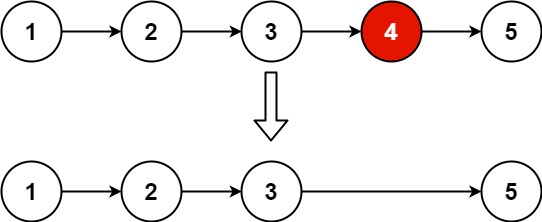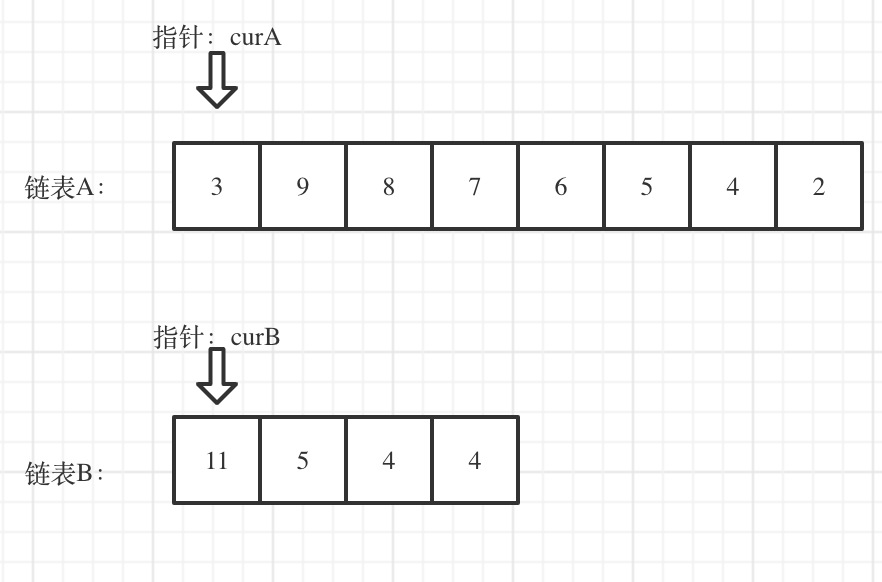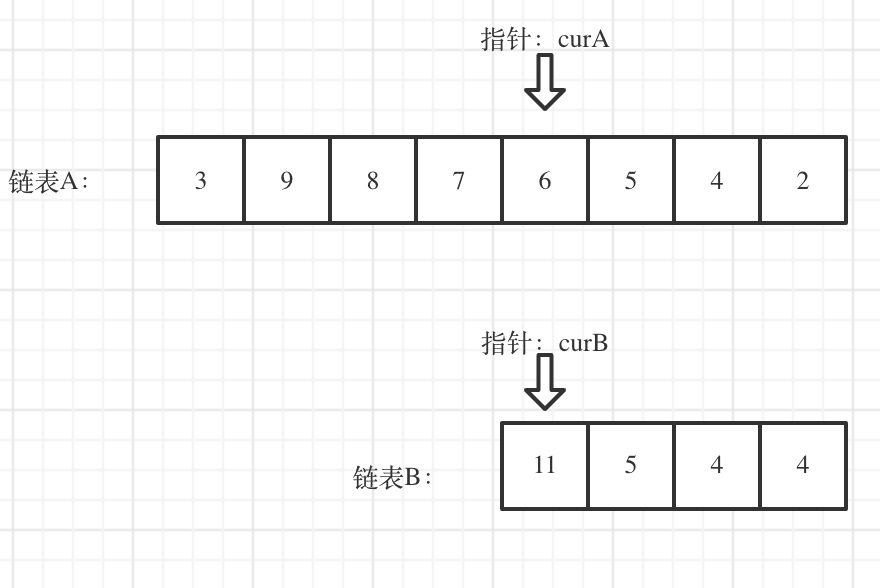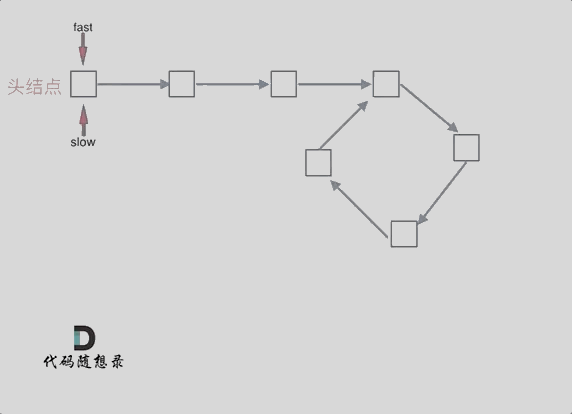代码随想录算法训练营第四天 | 24. 两两交换链表中的节点、19.删除链表的倒数第N个节点 、面试题 02.07. 链表相交、142.环形链表II、 链表总结
24. 两两交换链表中的节点 - 力扣(LeetCode)
给你一个链表,两两交换其中相邻的节点,并返回交换后链表的头节点。
你必须在不修改节点内部的值的情况下完成本题(即,只能进行节点交换)。
输入: head = [1,2,3,4]
输出: [2,1,4,3]
算法
初始时,cur指向虚拟头结点,然后进行如下三步:
操作之后,链表如下:
看这个可能就更直观一些了:

1 class Solution { 2 public ListNode swapPairs(ListNode head) { 3 ListNode dummy = new ListNode(0); 4 dummy.next = head; 5 ListNode cur = dummy; 6 ListNode temp; 7 ListNode firstNode; 8 ListNode secondNode; 9 while (cur.next != null && cur.next.next != null) { 10 temp = cur.next.next.next; 11 firstNode = cur.next; 12 secondNode = cur.next.next; 13 cur.next = secondNode; 14 secondNode.next = firstNode; 15 firstNode.next = temp; 16 cur = firstNode; 17 } 18 return dummy.next; 19 } 20 }
19.删除链表的倒数第N个节点
给你一个链表,删除链表的倒数第 n 个结点,并且返回链表的头结点。
Input: head = [1,2,3,4,5], n = 2 Output: [1,2,3,5]
算法
-
定义fast指针和slow指针,初始值为虚拟头结点,如图:

fast首先走n + 1步 ,为什么是n+1呢,因为只有这样同时移动的时候slow才能指向删除节点的上一个节点(方便做删除操作),如图:

fast和slow同时移动,直到fast指向末尾,如题:

删除slow指向的下一个节点,如图

/** * Definition for singly-linked list. * public class ListNode { * int val; * ListNode next; * ListNode() {} * ListNode(int val) { this.val = val; } * ListNode(int val, ListNode next) { this.val = val; this.next = next; } * } */ class Solution { public ListNode removeNthFromEnd(ListNode head, int n) { ListNode dummy = new ListNode(0); dummy.next = head; ListNode slow = dummy; ListNode fast = dummy; while (n-- > 0&&fast != null) { fast = fast.next; } fast = fast.next; while (fast != null) { slow = slow.next; fast = fast.next; } slow.next = slow.next.next; return dummy.next; } }
面试题 02.07. 链表相交
给你两个单链表的头节点 headA 和 headB ,请你找出并返回两个单链表相交的起始节点。如果两个链表没有交点,返回 null 。
图示两个链表在节点 c1 开始相交:

题目数据 保证 整个链式结构中不存在环。
注意,函数返回结果后,链表必须 保持其原始结构
简单来说,就是求两个链表交点节点的指针。 这里同学们要注意,交点不是数值相等,而是指针相等。
为了方便举例,假设节点元素数值相等,则节点指针相等。
看如下两个链表,目前curA指向链表A的头结点,curB指向链表B的头结点:

我们求出两个链表的长度,并求出两个链表长度的差值,然后让curA移动到,和curB 末尾对齐的位置,如图:

此时我们就可以比较curA和curB是否相同,如果不相同,同时向后移动curA和curB,如果遇到curA == curB,则找到交点。
否则循环退出返回空指针。
代码
/** * Definition for singly-linked list. * public class ListNode { * int val; * ListNode next; * ListNode(int x) { * val = x; * next = null; * } * } */ public class Solution { public ListNode getIntersectionNode(ListNode headA, ListNode headB) { ListNode curA = headA; ListNode curB = headB; int lenA = 0, lenB = 0; while (curA != null) { lenA++; curA = curA.next; } while (curB != null) { lenB++; curB = curB.next; } curA = headA; curB = headB; if (lenB > lenA) { int tmpLen = lenA; lenA = lenB; lenB = tmpLen; ListNode tmpNode = curA; curA = curB; curB = tmpNode; } int gap = lenA - lenB; while (gap-- > 0) { curA = curA.next; } // 遍历curA 和 curB,遇到相同则直接返回 while (curA != null) { if (curA == curB) { return curA; } curA = curA.next; curB = curB.next; } return null; } }
给定一个链表的头节点 head ,返回链表开始入环的第一个节点。 如果链表无环,则返回 null。
如果链表中有某个节点,可以通过连续跟踪 next 指针再次到达,则链表中存在环。 为了表示给定链表中的环,评测系统内部使用整数 pos 来表示链表尾连接到链表中的位置(索引从 0 开始)。如果 pos 是 -1,则在该链表中没有环。注意:pos 不作为参数进行传递,仅仅是为了标识链表的实际情况。
不允许修改 链表。
示例 1:

输入:head = [3,2,0,-4], pos = 1 输出:返回索引为 1 的链表节点 解释:链表中有一个环,其尾部连接到第二个节点。
算法

/** * Definition for singly-linked list. * class ListNode { * int val; * ListNode next; * ListNode(int x) { * val = x; * next = null; * } * } */ public class Solution { public ListNode detectCycle(ListNode head) { if (head == null || head.next == null) { return null; } ListNode slow = head; ListNode fast = head.next; while (fast != slow) { if (fast == null || fast.next == null) { return null; } slow = slow.next; fast = fast.next.next; } while (head != slow.next) { head = head.next; slow = slow.next; } return head; } }




【推荐】国内首个AI IDE,深度理解中文开发场景,立即下载体验Trae
【推荐】编程新体验,更懂你的AI,立即体验豆包MarsCode编程助手
【推荐】抖音旗下AI助手豆包,你的智能百科全书,全免费不限次数
【推荐】轻量又高性能的 SSH 工具 IShell:AI 加持,快人一步
· 分享一个免费、快速、无限量使用的满血 DeepSeek R1 模型,支持深度思考和联网搜索!
· 基于 Docker 搭建 FRP 内网穿透开源项目(很简单哒)
· ollama系列1:轻松3步本地部署deepseek,普通电脑可用
· 按钮权限的设计及实现
· 25岁的心里话